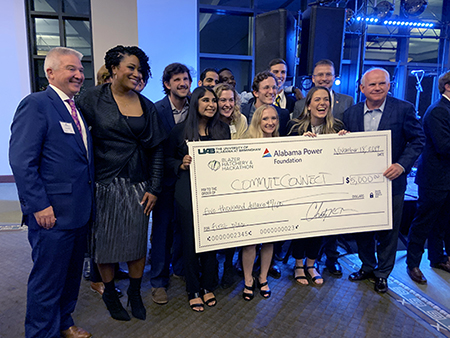 The Blazer Hatchery winning team, CommuteConnect, celebrates their victory and cash prize of $5,000.The entrepreneurship program continues to expand at the University of Alabama at Birmingham. It fosters collaboration across campus and makes an impact on the community, as the recent and inaugural Blazer Hatchery and Hackathon proved.
The Blazer Hatchery winning team, CommuteConnect, celebrates their victory and cash prize of $5,000.The entrepreneurship program continues to expand at the University of Alabama at Birmingham. It fosters collaboration across campus and makes an impact on the community, as the recent and inaugural Blazer Hatchery and Hackathon proved.
On Monday, Nov. 18, undergraduate and graduate students who participated in the two-month intensive experience, known as the Hatchery, competed in a pitch gala. Their mission? To present entrepreneurial solutions to a grand challenge that was presented to them. The event attracted approximately 300 members of the Birmingham region. The cohort of 25 students focused on inefficiencies in the transportation and energy sectors to build capacity for members of underserved communities to travel to their jobs more efficiently and reduce underemployment. The program gave UAB students who are strongly interested in entrepreneurship a chance to have actual entrepreneurial experiences.
CommuteConnect won first place during the event for their idea of connecting employees with jobs based on an online marketplace that analyzes transportation options. From the data collected by CommuteConnect, employers can find areas within Birmingham where their best prospective employees are located.
“For many individuals, one of the biggest challenges with finding a job is finding a way to get there,” said Selina Malone, team leader and a senior majoring in economics and math. “Our team created the idea of a personalized and innovative platform that connects employees with employers in a way that eliminates transportation barriers.”
The team won a cash prize of $5,000. The CommuteConnect team is composed of members of the UAB Collat School of Business sustainable economics class, including Malone, Christian Rosenberger, Sunna Savani, Zachary Pittman, Zach Resendez, Ania Krutul, Hannah Yingst, Luke Burkholder, John Morice, Guy-Joseph Kodjo and Johnathan Kelleher.
Second place was awarded to Hitchhub. This team designed a network of hubs connected by a carpool system. The platform allows riders to “hitch a ride” with experienced drivers at local stops. The hubs are modular and can change based on operations data. Hitchhub has a membership model for its users. It also offers a drive-to-own program that empowers people to own vehicles after driving for the company for a specified amount of time.
The Hitchhub team won a cash prize of $3,000. Members of the team included Tobenna Offodile, Harrison Gentle, Kirsten Holliman, Lillian Hewitt, Jarrod Barnes and Sophia Ngo.
The third-place winner was GapCar, which offers low-income communities their own car without having to rely on public transportation or rideshare companies. First, operable cars are purchased from salvage yards. GapCar partners with school mechanic programs to repair the vehicles and sell them affordably to underserved communities. The GapCar model involves monthly car payments that range from $50 to $175. It enables people to travel to work, pick up children from school, shop for groceries and meet other transportation needs.
GapCar was a awarded a $2,000 cash prize. Members of the team included Raemah Henderson, Viral Patel, Eugene Perryman, Brian Gronewold and Kristin Bryan.
In the Hatchery portion of the program, students received intensive training in the entrepreneurial mindset from Patrick J. Murphy, Ph.D., the Goodrich Endowed Chair for Innovation and Entrepreneurship. Murphy envisioned and developed this program to serve students from all disciplines at UAB who are not yet entrepreneurs, but who have strong entrepreneurial aspirations. The program received 90 applications from students across the university. A team of judges selected 25 members for the inaugural cohort.
After the Hatchery, students were divided into five teams, and Alabama Power Assistant Treasurer Chris Blake presented them with the Hackathon challenge.
Over the next month, the teams acted as entrepreneurial ventures. They worked independently to build entrepreneurial solutions to the problem. They utilized diverse talents and entrepreneurial competencies from the Hatchery. UAB offered the teams administrative support, pitch coaching, and programming/development resources throughout the experience.
A judging panel consisting of Alabama Power executives, City of Birmingham leadership and founders of companies selected the winning teams. The UAB Blazer Hatchery and Hackathon is sponsored by the Alabama Power Foundation